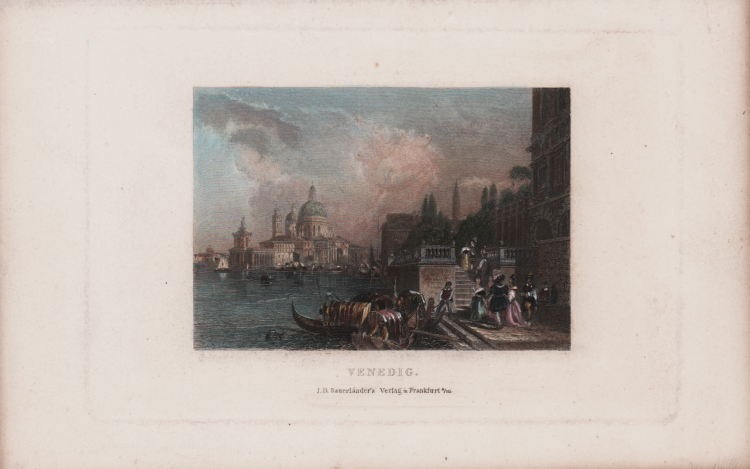


| Reference: | S47324 |
| Author | Johann David Sauerländer |
| Year: | 1860 ca. |
| Zone: | Venice |
| Printed: | Frankfurt |
| Measures: | 152 x 100 mm |


| Reference: | S47324 |
| Author | Johann David Sauerländer |
| Year: | 1860 ca. |
| Zone: | Venice |
| Printed: | Frankfurt |
| Measures: | 152 x 100 mm |
Bella veduta di Venezia stampata a Francoforte dalla tipografia di Johann David Sauerländer.
Acquaforte, finemente colorata a mano, in ottimo stato di conservazione.
Johann David Sauerländer (Francoforte 1789 - 1869)
|
Johann David Sauerländer (born September 30, 1789 in Frankfurt am Main; November 26, 1869 in Frankfurt am Main) was a German publisher. Johann David Sauerländer came from a family of book printers. His father, the book printer Johann Christian Sauerländer (1745-1805), moved from Erfurt to Frankfurt in 1771, where he took over the print shop of his father-in-law Johann David Scheper (1702-1771), which had been founded in 1613. Johann David Sauerländer followed his brother Heinrich Remigius Sauerländer to Basel to the bookseller Samuel Flick and finally in 1803 to Aarau, where he founded a publishing house (Verlag Sauerländer).[1] In 1815 he was in Heidelberg with the publishing house Mohr & Zimmer. In 1816 he took over his father's print shop in Frankfurt, until 1818 with his brother Philipp Friedrich, to which he added a publishing house, J. D. Sauerländer's Verlag, and a bookshop in 1818. Here he emerged primarily as a publisher of literary works in favorable editions, such as those by Walter Scott, James Fenimore Cooper, Victor Hugo, Friedrich Rückert and Clemens Brentano. In 1835, he published the literary journal "Phönix. Frühlings-Zeitung für Deutschland" by Eduard Duller and became the publisher of Georg Büchner; in 1835 he published "Danton's Death" as well as his posthumous writings in 1850. He also published specialist books in the fields of theology, law, political science, philosophy and forestry. From 1832, he published the "Allgemeine Forst- und Jagdzeitung", and from 1839 to 1841 the journal "Israelitische Annalen. Ein Centralblatt für Geschichte, Literatur und Cultur der Israeliten aller Zeiten und Länder", and from 1841 the "Rheinisches Museum für Philologie". From 1848 to 1850, he published the "Stenographische Berichte über die Verhandlungen der deutschen. konstituierenden Nationalversammlung in Frankfurt am Main" (10 volumes).
|
Johann David Sauerländer (Francoforte 1789 - 1869)
|
Johann David Sauerländer (born September 30, 1789 in Frankfurt am Main; November 26, 1869 in Frankfurt am Main) was a German publisher. Johann David Sauerländer came from a family of book printers. His father, the book printer Johann Christian Sauerländer (1745-1805), moved from Erfurt to Frankfurt in 1771, where he took over the print shop of his father-in-law Johann David Scheper (1702-1771), which had been founded in 1613. Johann David Sauerländer followed his brother Heinrich Remigius Sauerländer to Basel to the bookseller Samuel Flick and finally in 1803 to Aarau, where he founded a publishing house (Verlag Sauerländer).[1] In 1815 he was in Heidelberg with the publishing house Mohr & Zimmer. In 1816 he took over his father's print shop in Frankfurt, until 1818 with his brother Philipp Friedrich, to which he added a publishing house, J. D. Sauerländer's Verlag, and a bookshop in 1818. Here he emerged primarily as a publisher of literary works in favorable editions, such as those by Walter Scott, James Fenimore Cooper, Victor Hugo, Friedrich Rückert and Clemens Brentano. In 1835, he published the literary journal "Phönix. Frühlings-Zeitung für Deutschland" by Eduard Duller and became the publisher of Georg Büchner; in 1835 he published "Danton's Death" as well as his posthumous writings in 1850. He also published specialist books in the fields of theology, law, political science, philosophy and forestry. From 1832, he published the "Allgemeine Forst- und Jagdzeitung", and from 1839 to 1841 the journal "Israelitische Annalen. Ein Centralblatt für Geschichte, Literatur und Cultur der Israeliten aller Zeiten und Länder", and from 1841 the "Rheinisches Museum für Philologie". From 1848 to 1850, he published the "Stenographische Berichte über die Verhandlungen der deutschen. konstituierenden Nationalversammlung in Frankfurt am Main" (10 volumes).
|